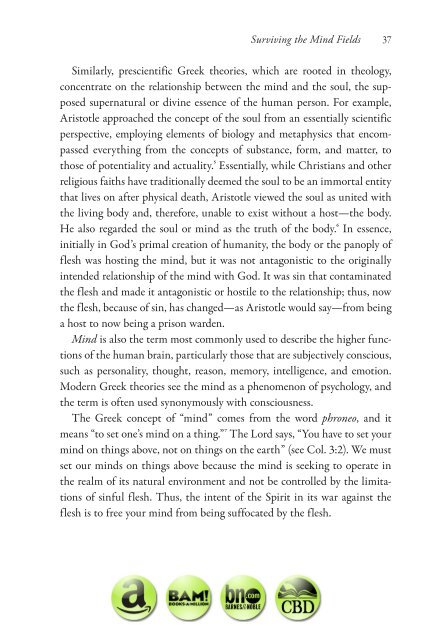Battle for the Mind:How You Can Think the ... - Destiny Image
Battle for the Mind:How You Can Think the ... - Destiny Image
Battle for the Mind:How You Can Think the ... - Destiny Image
Create successful ePaper yourself
Turn your PDF publications into a flip-book with our unique Google optimized e-Paper software.
Surviving <strong>the</strong> <strong>Mind</strong> Fields 37<br />
Similarly, prescientific Greek <strong>the</strong>ories, which are rooted in <strong>the</strong>ology,<br />
concentrate on <strong>the</strong> relationship between <strong>the</strong> mind and <strong>the</strong> soul, <strong>the</strong> supposed<br />
supernatural or divine essence of <strong>the</strong> human person. For example,<br />
Aristotle approached <strong>the</strong> concept of <strong>the</strong> soul from an essentially scientific<br />
perspective, employing elements of biology and metaphysics that encompassed<br />
everything from <strong>the</strong> concepts of substance, <strong>for</strong>m, and matter, to<br />
those of potentiality and actuality. 5 Essentially, while Christians and o<strong>the</strong>r<br />
religious faiths have traditionally deemed <strong>the</strong> soul to be an immortal entity<br />
that lives on after physical death, Aristotle viewed <strong>the</strong> soul as united with<br />
<strong>the</strong> living body and, <strong>the</strong>re<strong>for</strong>e, unable to exist without a host—<strong>the</strong> body.<br />
He also regarded <strong>the</strong> soul or mind as <strong>the</strong> truth of <strong>the</strong> body. 6 In essence,<br />
initially in God’s primal creation of humanity, <strong>the</strong> body or <strong>the</strong> panoply of<br />
flesh was hosting <strong>the</strong> mind, but it was not antagonistic to <strong>the</strong> originally<br />
intended relationship of <strong>the</strong> mind with God. It was sin that contaminated<br />
<strong>the</strong> flesh and made it antagonistic or hostile to <strong>the</strong> relationship; thus, now<br />
<strong>the</strong> flesh, because of sin, has changed—as Aristotle would say—from being<br />
a host to now being a prison warden.<br />
<strong>Mind</strong> is also <strong>the</strong> term most commonly used to describe <strong>the</strong> higher functions<br />
of <strong>the</strong> human brain, particularly those that are subjectively conscious,<br />
such as personality, thought, reason, memory, intelligence, and emotion.<br />
Modern Greek <strong>the</strong>ories see <strong>the</strong> mind as a phenomenon of psychology, and<br />
<strong>the</strong> term is often used synonymously with consciousness.<br />
The Greek concept of “mind” comes from <strong>the</strong> word phroneo, and it<br />
means “to set one’s mind on a thing.” 7 The Lord says, “<strong>You</strong> have to set your<br />
mind on things above, not on things on <strong>the</strong> earth” (see Col. 3:2). We must<br />
set our minds on things above because <strong>the</strong> mind is seeking to operate in<br />
<strong>the</strong> realm of its natural environment and not be controlled by <strong>the</strong> limitations<br />
of sinful flesh. Thus, <strong>the</strong> intent of <strong>the</strong> Spirit in its war against <strong>the</strong><br />
flesh is to free your mind from being suffocated by <strong>the</strong> flesh.




